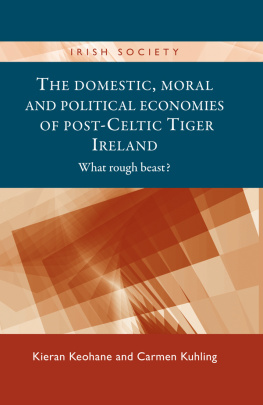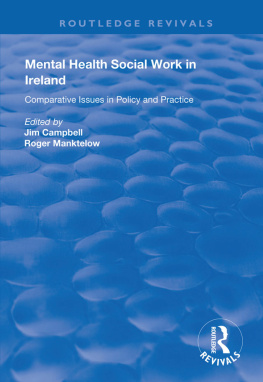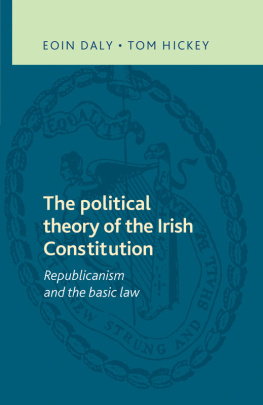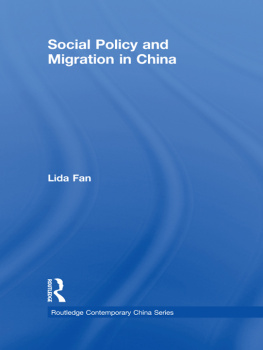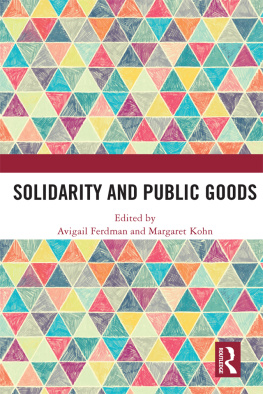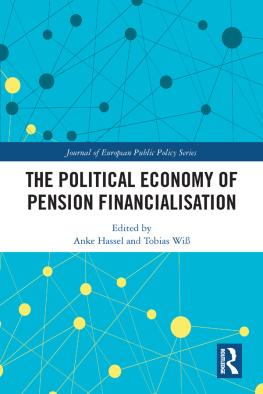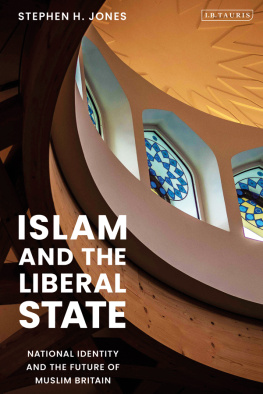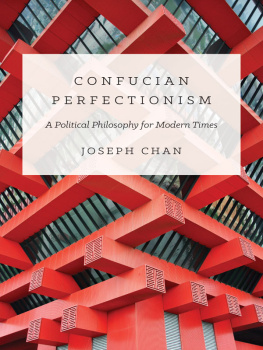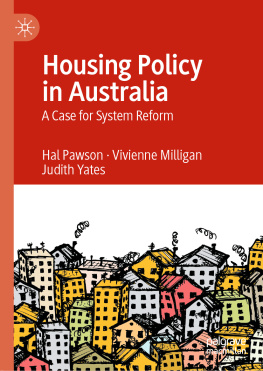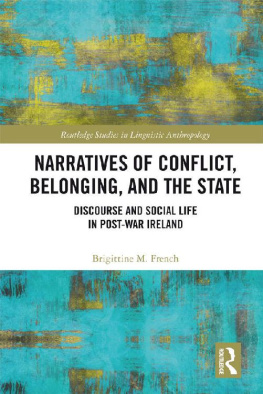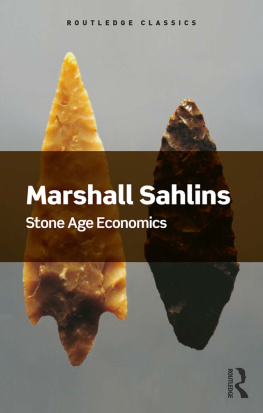T HE DOMESTIC, MORAL AND POLITICAL
ECONOMIES OF POST -C ELTIC T IGER I RELAND
IRISH SOCIETY
The Irish Society series provides a critical, interdisciplinary and in-depth analysis of Ireland that reveals the processes and forces shaping social, economic, cultural and political life, and their outcomes for communities and social groups. The books seek to understand the evolution of social, economic and spatial relations from a broad range of perspectives, and explore the challenges facing Irish society in the future given present conditions and policy instruments.
S ERIES EDITOR
Rob Kitchin
A LREADY PUBLISHED
Public private partnerships in Ireland: Failed experiment or the way forward for the state? Rory Hearne
Migrations: Ireland in a global world
Edited by Mary Gilmartin and Allen White
T HE DOMESTIC, MORAL AND POLITICAL ECONOMIES OF POST -C ELTIC T IGER I RELAND
What rough beast?
Kieran Keohane and Carmen Kuhling
MANCHESTER UNIVERSITY PRESS
Manchester and New York
distributed in the United States exclusively
by Palgrave Macmillan
Copyright Kieran Keohane and Carmen Kuhling 2014
The rights of Kieran Keohane and Carmen Kuhling to be identified as the authors of this work have been asserted by them in accordance with the Copyright, Designs and Patents Act 1988.
Published by Manchester University Press
Oxford Road, Manchester M13 9NR, UK
and Room 400, 175 Fifth Avenue, New York, NY 10010, USA
www.manchesteruniversitypress.co.uk
Distributed in the United States exclusively by
Palgrave Macmillan, 175 Fifth Avenue, New York,
NY 10010, USA
Distributed in Canada exclusively by
UBC Press, University of British Columbia, 2029 West Mall,
Vancouver, BC, Canada V6T 1Z2
British Library Cataloguing-in-Publication Data
A catalogue record for this book is available from the British Library
Library of Congress Cataloging-in-Publication Data applied for
ISBN 978 07190 8482 9 hardback
First published 2014
The publisher has no responsibility for the persistence or accuracy of URLs for any external or third-party internet websites referred to in this book, and does not guarantee that any content on such websites is, or will remain, accurate or appropriate.
Typeset in Minion
by Action Publishing Technology Ltd, Gloucester
Series editors foreword
Over the past twenty years Ireland has undergone enormous social, cultural and economic change. From a poor, peripheral country on the edge of Europe with a conservative culture dominated by tradition and Church, Ireland transformed into a global, cosmopolitan country with a dynamic economy. At the heart of the processes of change was a new kind of political economic model of development that ushered in the so-called Celtic Tiger years, accompanied by renewed optimism in the wake of the ceasefires in Northern Ireland and the peace dividend of the Good Friday Agreement. As Ireland emerged from decades of economic stagnation and The Troubles came to a peaceful end, the island became the focus of attention for countries seeking to emulate its economic and political miracles. Every other country, it seemed, wanted to be the next Tiger, modelled on Irelands successes. And then came the financial collapse of 2008, the bursting of the property bubble, bank bailouts, austerity plans, rising unemployment and a return to emigration. From being the paradigm case of successful economic transformation, Ireland has become an internationally important case study of what happens when an economic model goes disastrously wrong.
The Irish Society series provides a critical, interdisciplinary and in-depth analysis of Ireland that reveals the processes and forces shaping social, economic, cultural and political life, and their outcomes for communities and social groups. The books seek to understand the evolution of social, economic and spatial relations from a broad range of perspectives, and explore the challenges facing Irish society in the future given present conditions and policy instruments. The series examines all aspects of Irish society including, but not limited to: social exclusion, identity, health, welfare, life cycle, family life and structures, labour and work cultures, spatial and sectoral economy, local and regional development, politics and the political system, government and governance, environment, migration and spatial planning. The series is supported by the Irish Social Sciences Platform (ISSP), an all-island platform of integrated social science research and graduate education focusing on the social, cultural and economic transformations shaping Ireland in the twenty-first century. Funded by the Programme for Research in Third Level Institutions, the ISSP brings together leading social science academics from all of Irelands universities and other third-level institutions.
Given the marked changes in Irelands fortunes over the past two decades it is important that rigorous scholarship is applied to understand the forces at work, how they have affected different people and places in uneven and unequal ways, and what needs to happen to create a fairer and prosperous society. The Irish Society series provides such scholarship.
Rob Kitchin
Contents
We are trapped within the horizons of the present crisis, stuck in a moment that we cannot see our way out of, seeking return to growth, return to competitiveness, return to the Markets, repeating the same patterns over and over again, like a fly trapped in bottle, Wittgenstein ( a perspective on our situation by virtue of which we may be able to imagine alternatives?
Sociological imagination, C. Wright Mills (: 214). By this means we can think ourselves away and look back on our own reality from different points of view, see it on the one hand as strange, but also as not so unique as we had thought; that other peoples in other places, and we ourselves in other times, have grappled with similar problems and found ways through them from which we might learn.
Methods of theorizing
Social theory and method are inextricably bound up with one another, despite the convention of their separation and a tendency to differentiate them entirely by emphasizing technical training in particular methods over general education in culture and thinking. But to theorize, whether in Sociology, Philosophy, Politics, Anthropology, Economics or in any cognate field in the arts, humanities and social sciences, means not simply to arrange empirical evidence, but also to seek to clarify ideals by virtue of a way of inquiry that is sustained and methodically pursued, so much so that we may speak of method(s) of theorizing. Methods of theorizing are thus ways of attending to the world so as to bring into view, contemplate and articulate ideal standards of beauty, truth and the good life; radiant ideals that illuminate and make possible an understanding and interpretation of our present practices and institutions, thereby enabling our self-critique and self-transformation in light of such ideals.
According to Durkheim, the value of a thing cannot be, and never has been estimated except in relation to some conception of the ideal (sight of the ways towards recovering our ideals just at a time when economic crisis, ecological catastrophe and political turmoil threaten to overwhelm us.
Sociology as a vocation
Sociology retreats into the present and loses sight of ideals, relying on the myopic techniques of purportedly positive evidence and empirical analysis because the world ultimately refutes the aspiration of Enlightenment to master it. Despite the claims of modern social science that the world is rational and that it can be mastered by reason, Weber says:

